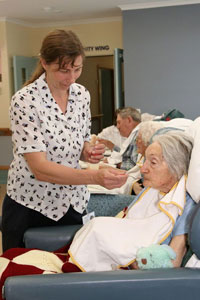
Joan has advanced dementia and has recently stopped eating her meals. When encouraged to eat, she becomes agitated and pushes her meals away. Joan is chair-bound, and requires assistance with all transfers. Joan is alert for periods of the day, though has been observed to fall asleep during meal times. Joan rarely speaks but will smile and nod agreement, and shows distress via groans and frowns. Joan has two children - a son and daughter in law, Paul and Maggie, who live nearby and visit regularly, and a daughter, Judy, who lives interstate. An advance care plan that was completed on admission to the facility a year ago indicates that Joan is for full active treatment.
Trigger:
Food refusal and recent weight loss
Assessment:
Prior to the case conference, the RN assesses Joan, conducting a physical examination, swallowing observation and medication review. Joan is observed to slowly swallow a few teaspoons of thickened fluid and pureed food. After a few minutes without swallowing, she begins to cough. In addition, Joan was assessed by a dentist, who found that her dentures appear to be fitting well and that their is no evidence of dry mouth or gum disease.
Attendance:
- Case conference facilitator – Chair
- Paul and Maggie
- GP to provide information on Joans medical condition and clinical management strategies
- Care staff to provide information on daily nutritional intake, her response to food and changes that have occurred over time
- Dietician to advise on strategies to maximise her nutritional intake
- RN to report findings of recent clinical assessments.
Key Discussion Points:
The RN informs the outcomes of assessments by herself and the dentist.
The GP indicates that Joan has a history of depression and that this could contribute to her lack of interest in food. He recommends further assessment for depression using the Cornell Scale for Depression and consideration of a trial of antidepressants if indicated.
Care staff indicate that Joans response to food varies, with most intake at the evening meal.
Paul is agitated and expresses concern that not enough is being done to help his Mum to eat, and complains that the food is bland and uninteresting.
Recognising the value that is placed on eating and food, the case conference facilitator acknowledges the family’s concerns about weight loss and the potential food has for contributing to quality of life, and explains how swallowing and appetite decrease as dementia progresses. She explains the benefits and burdens of tube feeding and the ongoing risk of aspiration, and explains the benefits of careful spoon feeding. The dietician also elicits from the family Joan’s preferences for food flavours and textures and speaks about ways to maximise nutrition and safety based on these.
Outcome:
- The family agreed that Joan should continue to be carefully spoon fed. Arrangements are made for further education of the family on appropriate techniques to assist with spoon feeding.
- A referral is made to a speech pathologist to conduct formal assessment of Joan’s swallowing to identify potential for interventions targeting positioning and behaviour.
- Depression assessment occurs and Joan is commenced on a trial of antidepressants.
- A decision is made that Joan will not be transferred to hospital if she develops pneumonia, although in other situations transfer may still be appropriate. A new advance care plan is developed indicating these changes.
Last updated 04 November 2015